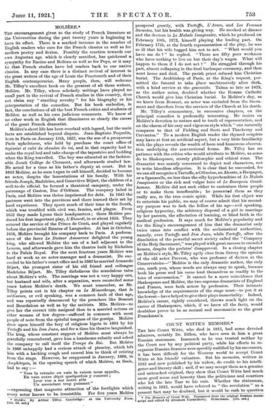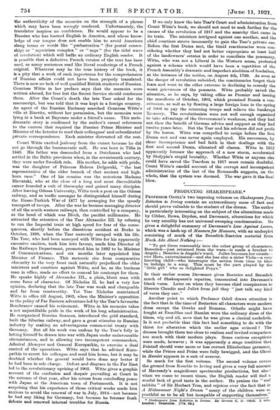COUNT WITTE'S MEMOIRS.* THE late Count Witte, who died in
1915, had some devoted admirers, notably Dr. Dillon, who have seen in him a great Russian statesman. Inasmuch as he was trusted neither by the Court nor by any political party, while his efforts to re- organize Russian finances were speedily nullified by his successors, it has been difficult for the Western world to accept Count Witte at his friends' valuation. But his memoirs, written in 1912 and now published by his widow, do credit to his intelli- gence and literary skill ; and, if we may accept them as a genuine and untouched original, they show that Count Witte had much more good sense and honesty than the politicians and courtiers who led the late Tsar to his ruin. Whether the statesman, writing in 1912, would have referred to " the revolution " as a present fact may be doubted, but it would be rash to question
• The Memoirs of Count Witte. Translated from the original Russian manu- script and edited by Abraham Yarmollnsky. Heinemann. [21s. net.]
the authenticity of the memoirs on the strength of a phrase which may have been wrongly rendered. Unfortunately, the translator inspires no confidence. He would appear to be a Russian who has learned English in America, and whose know- ledge of our tongue does not enable him to avoid American slang terms or words like " perlustration " (for postal censor- ship) or " mysticism complex " or " urge " (for the tidal wave of revolution) which will baffle an ordinary English reader. It is possible that a defective French version of the text has been used, as many sentences read like literal renderings of a French original. Whatever may be the true history of the book, it is a pity that a work of such importance for the comprehension of Russian affairs could not have been properly translated. There is now no lack of well qualified British students of Russian. Countess Witte in her preface says that the memoirs were written abroad, for fear lest the Secret Service should confiscate them. After the Count's death the late Tsar asked for the manuscript, but was told that it was kept in a foreign country. An agent of the Russian Embassy searched Countess Witte's villa at Biarritz, without her permission, but the memoirs were lying in a bank at Bayonne under a friend's name. This melo- dramatic story is confirmed by the author's casual references to the custom that required the Russian Prime Minister and Minister of the Interior to read their-colleagues' and subordinates' private correspondence. Each minister distrusted all the rest.
Count Witte excited jealousy from the outset because he did not go through the bureaucratic mill. He was born in Tiflis in 1849. His father was descended from a Dutchman who had settled in the Baltic provinces when, in the seventeenth century, they were under Swedish rule. His mother, he adds with pride, was the daughter of Princess Helena Dolgoruki, " the last representative of the older branch of that ancient and high- born race." One of his cousins was the notorious Madame Blavataki, who at the close of a long and most discreditable career founded a cult of theosophy and gained many disciples. After leaving Odessa University, Witte took a post on the Odessa railway, and as traffic manager he distinguished himself during the Russo-Turkish War of 1877 by arranging for the speedy transport of troops. After the war he became managing director of all the south-western railways, then controlled by a company, at the head of which was Bloch, the pacifist millionaire. He attracted the attention of the Tsar Alexander III. by refusing to run the Imperial train at high speed for fear of the conse- quences, shortly before the disastrous accident at Borko in October, 1888, when the Tsar narrowly escaped with his life. The Tsar, who had been annoyed with Witte for his apparently excessive caution, took him into favour, made him Director of the Railways Department, promoted him in 1892 to be Minister of Communications, and six months later appointed him Minister of Finance. This meteoric rise from comparative obscurity to the very front rank naturally prejudiced the older ministers and courtiers against Witte, and he, as the business man in office, made no effort to conceal his contempt for them. He speaks highly of Alexander DI., a plain, blunt man with some force of character. Of Nicholas II. he had a very low opinion, declaring that the late Tsar was weak and changeable and far from trustworthy. Yet Tsar Nicholas maintained Witte in office till August, 1903, when the Minister's opposition
to the policy of Far Eastern adventure led by the Tsar's favourite Bezobrazov caused his retirement. Witte in his memoirs takes a not unjustifiable pride in the work of his long administration.
He reorganized Russian finances, introduced the gold standard, built the Siberian railway, and gave a great stimulus to Russian industry by making an advantageous commercial treaty with Germany. But all his work was undone by the Tsar's folly in letting himself be drawn into war with Japan under unfavourable circumstances, and in allowing two incompetent commanders, Admiral Alexeyev and General Kuropatkin, to exercise a dual control of the operations. Witte says that he advised Kuro- patkin to arrest his colleague and send him home, but it may be doubted whether the general would have done any better if he had been in sole charge. Defeat and disgrace in the Far East led to the revolutionary uprising of 1905. Witte gives a graphic account of the confusion and despair prevailing at Court in the autumn of that year, after his return from concluding peace with Japan at the American town of Portsmouth. It is not surprising that his experience of those critical weeks made him anxious to avoid the renewal of war in July, 1914—not because he had any liking for Germany, but because he foresaw fresh defeats and renewed internal troubles for Russia.
If we only knew the late Taar'a Court and administration from Count Witte's book, we should not need to seek further for the causes of the revolution of 1917 and the anarchy that came in its train. The ministers intrigued against one another, and the chief courtiers strove incessantly to gain the Tsar's private ear. Before the first Duma met, the timid reactionaries were con- sidering whether they had not better expropriate at least half of the landowners' estates in order to conciliate the peasantry. Witte, who was not a Liberal in the Western sense, protested against a scheme which would have been a repetition of the French Assembly's dramatic and imperfect abolition of feudalism, at the instance of the nobles, on August 4th, 1789. As soon as the danger of revolution subsided, the reactionaries forgot their fears and went to the other extreme in declining to remedy the worst grievances of the peasants. Witte probably saved- the situation, as he says, by taking office as Premier and issuing the manifesto of October, 1905, which promised Russia a con- stitution, as well as by floating a large foreign loan in the spring of 1906 to pay the returning troops and relieve the bankrupt Treasury. The revolutionists were not well enough organized to take advantage of the Government's weakness, and they had not then the benefit of German advice and support as they had twelve years later. But the Tsar and his advisers did not profit by the lesson. Witte was compelled to resign before the first Duma met and was never again employed. His successors, by sheer incompetence and bad faith in their dealings with the first and second Duma„ alienated all classes. Witte in 1912 apparently foresaw the approach of a new storm, accelerated by Stolypin's stupid brutality. Whether Witte or anyone else could have saved the Tsardom in 1917 must remain doubtful. Count Witte's candid amount of the corrupt and incompetent administration of the last of the Romanoffs suggests, on the whole, that the system was doomed. The war gave it the final
blow. •



































 Previous page
Previous page